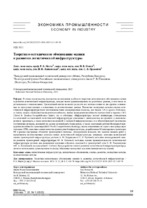| dc.contributor.author | Ивуть, Р. Б. | |
| dc.contributor.author | Попов, П. В. | |
| dc.contributor.author | Лапковская, П. И. | |
| dc.contributor.author | Прокопов, С. В. | |
| dc.coverage.spatial | Минск | ru |
| dc.date.accessioned | 2023-02-08T11:10:10Z | |
| dc.date.available | 2023-02-08T11:10:10Z | |
| dc.date.issued | 2023 | |
| dc.identifier.citation | Теоретико-методическое обоснование оценки и развития логистической инфраструктуры = Theoretical and Methodological Substantiation of the Assessment and Development of Logistics Infrastructure / Р. Б. Ивуть [и др.] // Наука и техника. – 2023. – № 1. – С. 69-78. | ru |
| dc.identifier.uri | https://rep.bntu.by/handle/data/126108 | |
| dc.description.abstract | В статье представлены результаты исследования в области теоретико-методического обоснования оценки и развития логистической инфраструктуры, которая может функционировать на различных уровнях, в том числе на региональном и национальном. Проведенный анализ позволил разделить все методы оценки на две группы: основанные на экспертных оценках и основанные на количественных данных. В качестве экспертных методов оценки логистической инфраструктуры были исследованы такие международные подходы, как индекс LPI (Logistics Performance Index); индекс глобальной конкурентоспособности; индекс конкурентоспособности путешествий и туризма TTCI (Travel & Tourism Competitiveness Index), где в субиндекс «Инфраструктура» входят индикаторы, относящиеся и к основной составляющей логистической инфраструктуры (связанные с деятельностью воздушного и железнодорожного транспорта, а также качеством воздушной и наземной инфраструктуры), и к обеспечивающей (количество гостиничных номеров, компаний по аренде автомобилей, банкоматов), а также ежегодный рейтинг Всемирной конкурентоспособности стран мира (IMD World Competitiveness Ranking); индекс вовлеченности стран в международную торговлю (ETI); методика оценки качества транспортной инфраструктуры, разработанная Министерством транспорта РФ в рамках программы «Развитие транспортной системы». Исследования показали, что имеется немного работ с применением количественных методов оценки логистической инфраструктуры, например: методика комплексной оценки транспортной инфраструктуры региона А. М. Кудрявцева и Л. Н. Рудневой, методика многоуровневой оценки развития транспортной инфраструктуры Ю. В. Катаевой, методика оценки привлекательности логистической инфраструктуры региона для размещения ключевых объектов складской и транспортной сети А. Н. Рахмангулова и О. А. Копыловой, исследования F. Carlucci. При разработке планов развития логистической инфраструктуры предлагается использовать существующие подходы, объединяя экспертные и количественные методы оценки. | ru |
| dc.language.iso | ru | ru |
| dc.publisher | БНТУ | ru |
| dc.title | Теоретико-методическое обоснование оценки и развития логистической инфраструктуры | ru |
| dc.title.alternative | Theoretical and Methodological Substantiation of the Assessment and Development of Logistics Infrastructure | ru |
| dc.type | Article | ru |
| dc.identifier.doi | 10.21122/2227-1031-2023-22-1-69-78 | |
| local.description.annotation | The paper presents the research results in the field of theoretical and methodological substantiation of the assessment and development of a logistics infrastructure that can operate at various levels, including regional and national. The analysis carried out has made it possible to divide all assessment methods into two groups: those based on expert assessments and those based on quantitative data. As expert methods for assessing the logistics infrastructure, such international approaches were studied as LPI index (Logistics Performance Index); global competitiveness index; TTCI index (Travel & Tourism Competitiveness Index), where “Infrastructure” subindex includes indicators related to both the main component of the logistics infrastructure (related to the activities of air and rail transport, as well as the quality of air and ground infrastructure), and to the supporting one (number of hotel rooms, car rental companies, ATMs), as well as the annual rating of World competitiveness of the countries of the world (IMD World Competitiveness Ranking); index of involvement of countries in international trade (ETI); methodology for assessing the quality of transport infrastructure, developed by the Ministry of Transport of the Russian Federation within the framework of the program “Development of the transport system”. Studies have shown that there are few works using quantitative methods for assessing the logistics infrastructure, for example: a method for a comprehensive assessment of the transport infrastructure of a region by A. M. Kudryavtsev and L. N. Rudneva, Yu. V. Kataev’s method for a multi-level assessment of the development of transport infrastructure, methodology for assessing the attractiveness of the region’s logistics infrastructure for accommodating key objects of the warehouse and transport network developed by A. N. Rakhmangulov and O. A. Kopylova, researches of F. Carlucci. While preparing plans for the development of logistics infrastructure, it is proposed to use existing approaches, combining expert and quantitative assessment methods. | ru |

